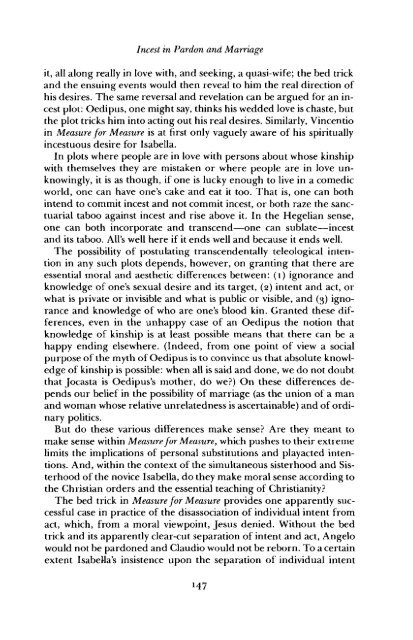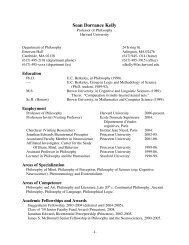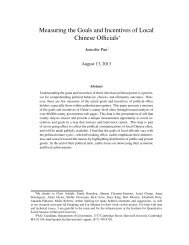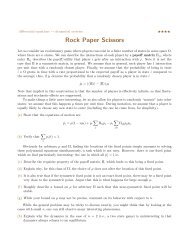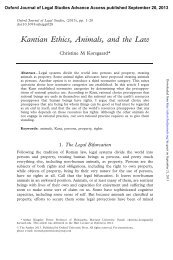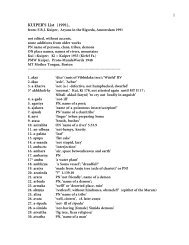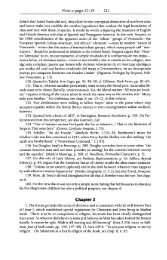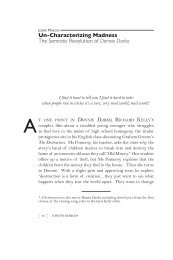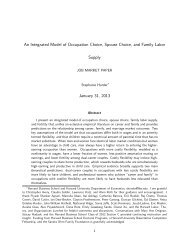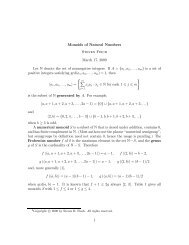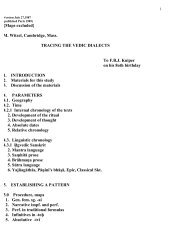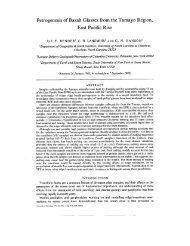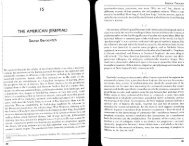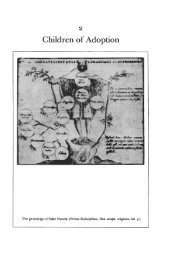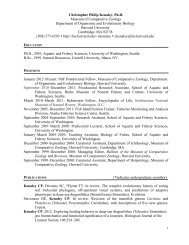Incest in Pardon and Marriage - People Fas Harvard
Incest in Pardon and Marriage - People Fas Harvard
Incest in Pardon and Marriage - People Fas Harvard
Create successful ePaper yourself
Turn your PDF publications into a flip-book with our unique Google optimized e-Paper software.
<strong>Incest</strong> <strong>in</strong> <strong>Pardon</strong> <strong>and</strong> <strong>Marriage</strong><br />
it, all along really <strong>in</strong> love with, <strong>and</strong> seek<strong>in</strong>g, a quasi-wife; the bed trick<br />
<strong>and</strong> the ensu<strong>in</strong>g events would then reveal to him the real direction of<br />
his desires. The same reversal <strong>and</strong> revelation can be argued for an <strong>in</strong>-<br />
cest plot: Oedipus, one might say, th<strong>in</strong>ks his wedded love is chaste, but<br />
the plot tricks him <strong>in</strong>to act<strong>in</strong>g out his real desires. Similarly, V<strong>in</strong>centio<br />
<strong>in</strong> Measure for Memure is at first only vaguely aware of his spiritually<br />
<strong>in</strong>cestuous desire for Isabella.<br />
In plots where people are <strong>in</strong> love with persons about whose k<strong>in</strong>ship<br />
with themselves they are mistaken or where people are <strong>in</strong> love un-<br />
know<strong>in</strong>gly, it is as though, if one is lucky enough to live <strong>in</strong> a comedic<br />
world, one can have one's cake <strong>and</strong> eat it too. That is, one can both<br />
<strong>in</strong>tend to commit <strong>in</strong>cest <strong>and</strong> not commit <strong>in</strong>cest, or both raze the sanc-<br />
tuarial taboo aga<strong>in</strong>st <strong>in</strong>cest <strong>and</strong> rise above it. In the Hegelian sense,<br />
one can both <strong>in</strong>corporate <strong>and</strong> transcend-one can sublate-<strong>in</strong>cest<br />
<strong>and</strong> its taboo. All's well here if it ends well <strong>and</strong> because it ends well.<br />
The possibility of postulat<strong>in</strong>g transcendentally teleological <strong>in</strong>ten-<br />
tion <strong>in</strong> any such plots depends, however, on grant<strong>in</strong>g that there are<br />
essential moral <strong>and</strong> aesthetic differences between: (1) ignorance <strong>and</strong><br />
knowledge of one's sexual desire <strong>and</strong> its target, (2) <strong>in</strong>tent <strong>and</strong> act, or<br />
what is private or <strong>in</strong>visible <strong>and</strong> what is public or visible, <strong>and</strong> (3) igno-<br />
rance <strong>and</strong> knowledge of who are one's blood k<strong>in</strong>. Granted these dif-<br />
ferences, even <strong>in</strong> the unhappy case of an Oedipus the notion that<br />
knowledge of k<strong>in</strong>ship is at least possible means that there can be a<br />
happy end<strong>in</strong>g elsewhere. (Indeed, from one po<strong>in</strong>t of view a social<br />
purpose of the myth of Oedipus is to conv<strong>in</strong>ce us that absolute knowl-<br />
edge of k<strong>in</strong>ship is possible: when all is said <strong>and</strong> done, we do not doubt<br />
that Jocasta is Oedipus's mother, do we?) On these differences de-<br />
pends our belief <strong>in</strong> the possibility of marriage (as the union of a man<br />
<strong>and</strong> woman whose relative unrelatedness is ascerta<strong>in</strong>able) <strong>and</strong> of ordi-<br />
nary politics.<br />
But do these various differences make sense? Are they meant to<br />
make sense with<strong>in</strong> Measure for Measure, which pushes to their extreme<br />
limits the implications of personal substitutions <strong>and</strong> playacted <strong>in</strong>ten-<br />
tions. And, with<strong>in</strong> the context of the simultaneous sisterhood <strong>and</strong> Sis-<br />
terhood of the novice Isabella, do they make moral sense accord<strong>in</strong>g to<br />
the Christian orders <strong>and</strong> the essential teach<strong>in</strong>g of Christianity?<br />
The bed trick <strong>in</strong> Measure for Measure provides one apparently suc-<br />
cessful case <strong>in</strong> practice of the disassociation of <strong>in</strong>dividual <strong>in</strong>tent from<br />
act, which, from a moral viewpo<strong>in</strong>t, Jesus denied. Without the bed<br />
trick <strong>and</strong> its apparently clear-cut separation of <strong>in</strong>tent <strong>and</strong> act, Angelo<br />
would not be pardoned <strong>and</strong> Claudio would not be reborn. To a certa<strong>in</strong><br />
extent Isabella's <strong>in</strong>sistence upon the separation of <strong>in</strong>dividual <strong>in</strong>tent


